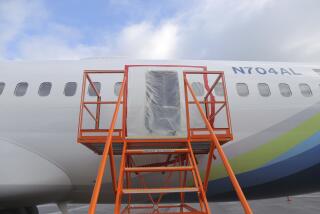NASA Is Chided for Faults in Safety Teams
- Share via
WASHINGTON — The head of the independent board investigating the Columbia disaster said Wednesday that NASA has not given enough clout to engineering and safety units within the agency that are meant to ensure the shuttle fleet’s reliability.
Harold W. Gehman Jr., the retired Navy admiral who chairs the Columbia Accident Investigation Board, told Congress that NASA appears to be “ill-served by an imperfect system of checks and balances.”
For instance, he said, engineering specialists may be too closely tied to NASA’s shuttle program to effectively offer an independent view of the condition of the orbiters.
Gehman said another group within the agency responsible for safety lacks enough personnel to give it heft.
“The safety organization is, on paper, perfect,” he said. “But when you bore down a little deeper, you don’t find any ‘there’ there.”
Gehman’s comments, his first public testimony on Capitol Hill since the Feb. 1 shuttle disaster, underscored that the Columbia probe is likely to result in recommendations that would shake up NASA management.
The investigation is expected to wrap up this summer; board members are focusing on damage to the leading edge of Columbia’s left wing that apparently allowed superheated gases to penetrate the shuttle -- causing its disintegration during reentry.
Gehman’s 13-member board plans to lay out how that damage may have happened to Columbia, which had been the oldest shuttle in the U.S. fleet, and what underlying problems at NASA should be addressed to prevent another catastrophe.
Appearing with Gehman before the Senate Committee on Commerce, Science and Transportation, NASA Administrator Sean O’Keefe insisted that any faults found in the agency’s management would be corrected.
“There will be accountability here, no question,” O’Keefe told senators.
Speaking with reporters afterward, O’Keefe praised Gehman’s call for more independent engineering systems within NASA.
“There’s a lot of wisdom in that observation,” he said.
O’Keefe has said recently that NASA needs to redouble its efforts to analyze long-term trends affecting critical components of the shuttles -- the sort of work that could demand independent engineering.
But O’Keefe reserved judgment on what Gehman said about the lack of depth in NASA’s safety team. “My opinion ... matters not at all,” O’Keefe said.
However, O’Keefe told reporters that he did not want to call for new safety procedures that could cause “massive gridlock” at the agency.
“There’s always going to be an element of risk in this,” he said.
Some lawmakers expressed dismay at Gehman’s analysis. Sen. Bill Nelson (D-Fla.), who flew on Columbia as a House member in 1986, said he had thought NASA’s safety teams, which were beefed up after the Challenger disaster 17 years ago, were adequate for the job. “That makes my blood boil,” he said.
In another development, Gehman said his board is intently studying what NASA might have done to try to save Columbia during its final mission if officials had known a disaster was imminent.
“We haven’t found any magic fix,” Gehman said. But he added: “Of course, we would have done something.”
The chief investigator disputed previous assertions that Columbia could not have flown in orbit for more than a couple days beyond its scheduled 16-day mission. He told reporters that investigators have learned that the shuttle could have flown “many more times than another couple days” while its crew and Mission Control presumably would have been racing for solutions to offset the wing damage.
Sen. John McCain (R-Ariz.), chairman of the panel, used the hearing to criticize what he called excessive spending in NASA’s budget. Money benefiting projects in the home states and districts of key lawmakers, he said, had surged in NASA’s budget to $167 million in the current fiscal year, up from just $24.7 million five years earlier.
McCain cited $1.35 million approved for a science center in Baltimore and $15.5 million for a scientific research institute in West Virginia. Two Democrats, Sens. Barbara A. Mikulski of Maryland and Robert C. Byrd of West Virginia, play important roles in determining appropriations for NASA.
McCain added: “It appears that NASA tries to curry favor with a broad base of [lawmakers] by trying to ensure that [agency] programs affect as many states as possible, even when this may not be the most effective or productive use of resources.”
More to Read
Sign up for Essential California
The most important California stories and recommendations in your inbox every morning.
You may occasionally receive promotional content from the Los Angeles Times.












